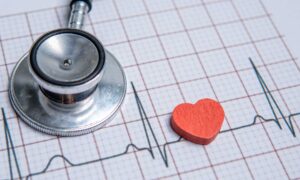An electrocardiogram (EKG and/or ECG) is a non-invasive test that intrinsically measures the complete electrical activity of the heart. It provides valuable information about the heart’s rhythm, rate, and overall electrical conduction system. Here are some key pieces of information obtained from an EKG:
- Heart Rate: The EKG provides an accurate measurement of the heart rate, which is the number of times the heart beats per minute (bpm). This information helps assess the heart’s rhythm and identify abnormalities such as tachycardia (fast heart rate) or bradycardia (slow heart rate).
- Heart Rhythm: The EKG shows the pattern and regularity of the heart’s electrical impulses, allowing healthcare providers to assess the heart’s rhythm. Normal sinus rhythm indicates that the heart’s electrical activity originates from the sinus node, the heart’s natural pacemaker. Abnormal rhythms, such as atrial fibrillation, atrial flutter, or ventricular arrhythmias, can also be detected on an EKG.
- Electrical Conduction: The machine traces the path of electrical impulses as they travel through the heart’s conduction system. It identifies abnormalities in the conduction pathways, such as atrioventricular (AV) block, bundle branch blocks, or Wolff-Parkinson-White (WPW) syndrome, which can affect the heart’s ability to pump blood effectively.
- Cardiac Hypertrophy: An EKG can detect signs of cardiac hypertrophy, which is an increase in the size or thickness of the heart muscle. This may be indicative of conditions such as hypertension, valvular heart disease, or cardiomyopathy.
- Ischemia or Infarction: Changes in the ST segment and T wave on an result can indicate myocardial ischemia (reduced blood flow to the heart muscle) or myocardial infarction (heart attack). These changes may suggest the presence of coronary artery disease or acute coronary syndromes.
- Chamber Enlargement: An EKG can detect signs of chamber enlargement, such as atrial enlargement or ventricular hypertrophy. These changes may be indicative of conditions such as heart failure, valvular heart disease, or pulmonary hypertension.
- Electrolyte Imbalance: Abnormalities in electrolyte levels, such as potassium, calcium, or magnesium, can affect the heart’s electrical activity and manifest as changes on an EKG. These changes may include T wave abnormalities, QT interval prolongation, or arrhythmias.
- Drug Effects: Certain medications and substances can affect the heart’s electrical conduction system and produce characteristic changes on an EKG. These changes may include QT interval prolongation, ST segment elevation or depression, or arrhythmias.

Overall, an EKG provides valuable information about the heart’s electrical activity, rhythm, and conduction system. It helps healthcare providers diagnose various cardiac conditions, assess the severity of heart disease, and guide treatment decisions. Abnormal findings on an EKG may result in additional testing including echocardiogram or stress testing. If you require an EKG or have concerns about your heart health, visit Rapid Med Urgent Care for expert evaluation and personalized care. We offer on-site EKG testing to help assess your heart function and ensure optimal cardiovascular health.

